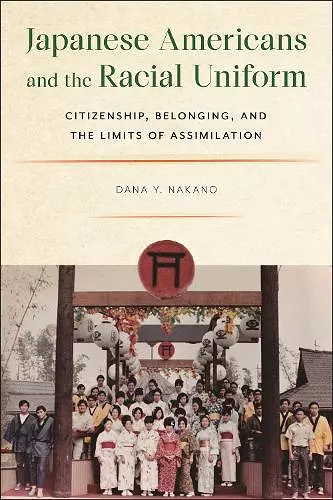Japanese Americans and the Racial Uniform
Citizenship, Belonging, and the Limits of Assimilation
Format:Hardback
Publisher:New York University Press
Published:15th Aug '23
Currently unavailable, and unfortunately no date known when it will be back

How race continues to shape the citizenship and everyday lives of later-generation Japanese
Americans
Japanese Americans are seen as the “model minority,” a group that has fully assimilated and excelled within the US. Yet third- and fourth-generation Japanese Americans continue to report feeling marginalized within the predominantly white communities they call home. Japanese Americans and the Racial Uniform explores this apparent contradiction, challenging the way society understands the role of race in social and cultural integration.
To explore race and the everyday practices of citizenship, Dana Y. Nakano begins at an unlikely site, Japanese Village and Deer Park, a now defunct Japan-themed amusement park in suburban Southern California. Drawing from extensive interviews with the park’s Japanese American employees as well as photographic imagery, Nakano shows how the employees' race acted as part of their work uniform and magnified their sense of alienation from their white peers and the park’s white visitors. While the racial perception of Japanese Americans as forever foreigners made them ideal employees for Deer Park, the same stigma continues to marginalizes Japanese Americans beyond the place and time of the amusement park. Into the present day, third and fourth generation Japanese Americans share feelings of racialized non-belonging and yearning for community. Japanese Americans and the Racial Uniform pushes us to rethink the persistent recognition of racial markers—the racial body as a visible, ever-present uniform—and how it continues to impact claims on an American identity and the lived experience of citizenship.
What are the limits to how assimilated and welcomed groups can become? How far do race and racism stretch to shape the lives of people who have been here for generations and identify as full Americans? Nakano deftly gets at these key questions through this easy-to-read, well-researched book on Japanese Americans in Southern California. It offers a necessary lens into how culture, race, and nationalism intersect in present-day America. * Pawan Dhingra, author of Hyper Education: Why Good Schools, Good Grades, and Good Behavior Are Not Enough *
A major contribution to Japanese American studies, especially on post-incarceration generations of US-born Sansei and Yonsei. Japanese Americans and the Racial Uniform sheds light on the fallacy of a perspective that assumes the end of “assimilation” for children and grandchildren of second-generation Asian Americans, and hence the neglect of their minoritized experiences. Deeply personal and yet theoretically sound, Nakano’s research unveils why and how race still matters to these ostensibly fully assimilated Americans. As later-generation citizens of Asian ancestries are sure to increase in number, this book stands as a trailblazer in the scholarship on race and being American in contemporary Asian America. * Eiichiro Azuma, author of In Search of Our Frontier: Japanese America and Settler Colonialism in the Construction of Japan’s Borderless Empire *
The book tells a fascinating and theoretically compelling story of the daily lived experience of third-plus generation Japanese Americans through an in-depth study of an ethnic theme park. It offers invaluable insight into the long-lasting insidious impact of race on a highly assimilated ethnic group and reminds readers of the continuing significance of race and the limits of assimilation in US society. * Min Zhou, co-editor of Contemporary Asian America *
Based upon extensive interviews with former employees, as well as collected visual images, Nakano examines Deer Park as a workplace that represented both racialized stereotypes and as a broadly positive ethnic community for its young adult workers. Deer Park traded upon race, regardless of generational differences; class position; cultural knowledge; or miscegenation. Indeed, then and now—as reinforced during the COVID era—race matters in the US as a highly contentious meeting ground of difference, etching sharp limits upon affective citizenship as national belonging. * CHOICE *
ISBN: 9781479816361
Dimensions: unknown
Weight: unknown
256 pages